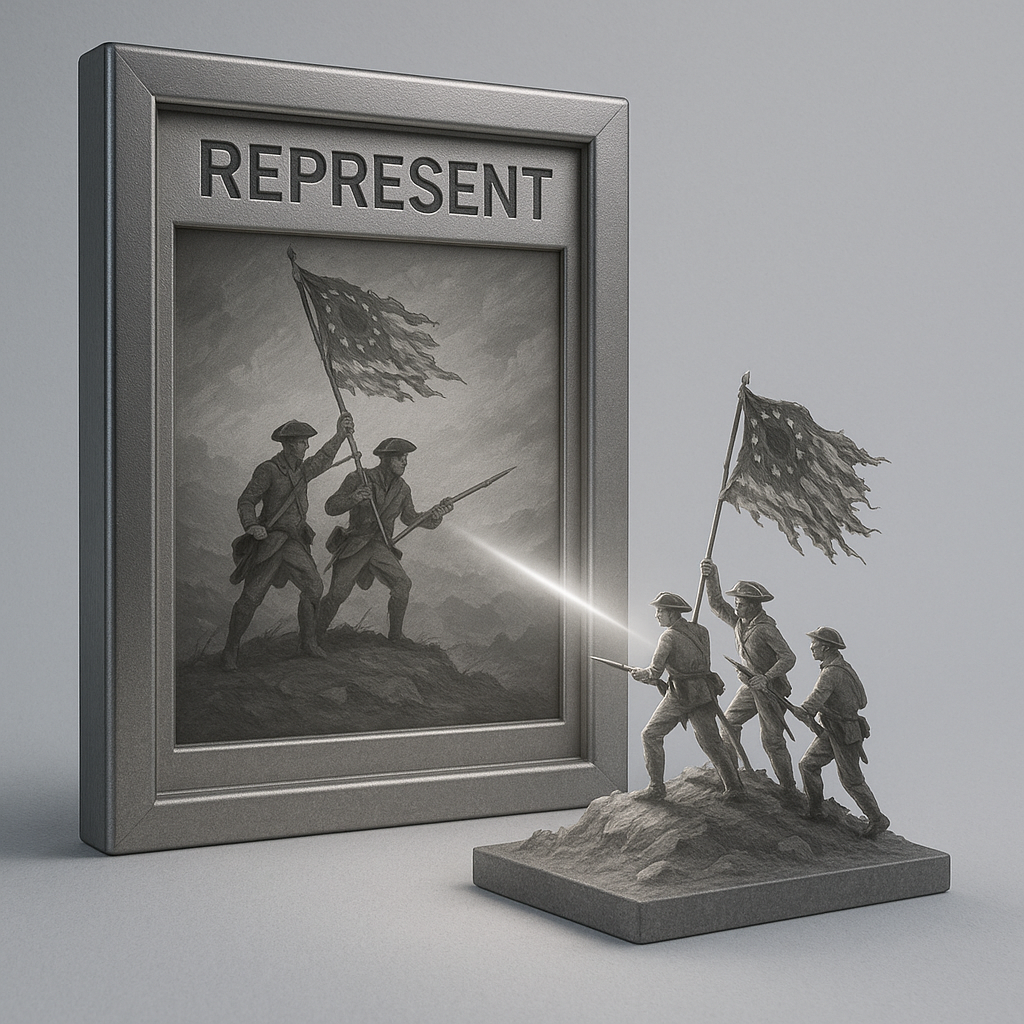Represent
Definition
The term "represent" describes the act of standing for, symbolizing, or speaking on behalf of someone or something.
Parts of Speech
- Verb
Pronunciation
American English
- IPA Pronunciation: /ˌrɛp.rɪˈzɛnt/
- Respelling: rep-ri-ZENT
British English
- IPA Pronunciation: /ˌrɛp.rɪˈzɛnt/
- Respelling: rep-ri-ZENT
Etymology
The word "represent" originates from the Latin "repraesentare," meaning "to present again," derived from "re-" (again) and "praesentare" (to present). It entered Middle English through Old French "representer."
Derivatives
- Representation (noun)
- Representative (noun, adjective)
- Representable (adjective)
- Misrepresent (verb)
- Representational (adjective)
Synonyms
- Symbolize
- Depict
- Advocate
Antonyms
- Misrepresent
- Obscure
- None
Usage
The term "represent" is used in contexts such as advocacy, symbolism, and substitution. For example, "The flag represents national unity" or "The lawyer will represent her client in court."
Related Terms
- Advocate: To speak or act in support of someone or something.
- Symbol: Something that stands for or represents something else.
- Delegate: A person authorized to act on behalf of others.
Detailed Definitions
Verb
- To stand for or symbolize: Refers to the act of serving as a symbol or sign for something else.
- Example: "The dove represents peace."
- To act or speak on behalf of someone: Refers to serving as an advocate or spokesperson.
- Example: "She represents her district in parliament."
- To depict or portray: Refers to showing or illustrating something in a particular way.
- Example: "The painting represents a historical event."
- To constitute or amount to: Refers to being equivalent to or indicative of something.
- Example: "This figure represents a 10% increase in sales."
represent



🇨🇳 Chinese (Mandarin)
- 代表 (dàibiǎo) - as in to represent a group or individual
- IPA: /tai51−55 piau214−35/
- Respelling: dai-biao
- 表示 (biǎoshì) - as in to represent an idea or concept
- IPA: /piau214−35 ʂɻ51−55/
- Respelling: biao-shi
🇮🇳 Hindi
- प्रतिनिधित्व करना (pratinidhitva karna) - to represent a group or individual
- IPA: /prət̪ɪnɪd̪ʱɪt̪ʋə kəɾnə/
- Respelling: pra-ti-nid-hi-tva kar-na
- दर्शाना (darshana) - as in to represent an idea or concept
- IPA: /d̪ərʃɑːnɑː/
- Respelling: dar-sha-na
🇪🇸 Spanish
- representar - general term for "represent"
- IPA: /repreˈsentar/
- Respelling: re-pre-sen-tar
- simbolizar - as in symbolize or represent
- IPA: /simboliˈθar/ (Spain), /simboliˈsar/ (Latin America)
- Respelling: sim-bo-li-zar
🇫🇷 French
- représenter - general term for "represent"
- IPA: /ʁepʁezɑ̃te/
- Respelling: re-pre-zan-te
- symboliser - as in symbolize or represent
- IPA: /sɛ̃bolize/
- Respelling: sin-bo-li-ze
🇸🇦 Arabic (Modern Standard Arabic)
- يمثل (yumaththilu) - general term for "represent"
- IPA: /jumaththilu/
- Respelling: yu-math-thi-lu
- تمثيل (tamtheel) - as in symbolize or represent
- IPA: /tamthi:l/
- Respelling: tam-theel
🇧🇩 Bengali
- প্রতিনিধিত্ব করা (pratinidhitôb kôra) - to represent a group or individual
- IPA: /pɾot̪inid̪ʱit̪o̯b kora/
- Respelling: pro-ti-nid-hi-tob ko-ra
- চিহ্নিত করা (cihnit kôra) - as in to represent an idea or concept
- IPA: /tʃihnit̪ kora/
- Respelling: chi-hnit ko-ra
🇷🇺 Russian
- представлять (predstavlyat') - to represent a group or individual
- IPA: /prʲɪdstɐˈvlʲætʲ/
- Respelling: pre-dsta-vlyat
- символизировать (simvolizirovat') - as in symbolize or represent
- IPA: /sʲɪmvəlʲɪzʲɪrəˈvatʲ/
- Respelling: sim-vo-li-zi-ro-vat
🇵🇹 Portuguese
- representar - general term for "represent"
- IPA: /ʁɛpɾɨzɨ̃ˈtaɾ/
- Respelling: re-pri-zin-tar
- simbolizar - as in symbolize or represent
- IPA: /sĩboliˈzaɾ/
- Respelling: sim-bo-li-zar
🇮🇩 Indonesian
- mewakili - to represent a group or individual
- IPA: /məwakili/
- Respelling: mə-wa-ki-li
- melambangkan - as in symbolize or represent
- IPA: /məlambaŋkan/
- Respelling: mə-lam-bang-kan
🇩🇪 German
- repräsentieren - general term for "represent"
- IPA: /ʁepʁeːzɛnˈtiːʁən/
- Respelling: re-pre-zen-tie-ren
- symbolisieren - as in symbolize or represent
- IPA: /zʏmboːliˈziːʁən/
- Respelling: zym-bo-li-zie-ren
🇯🇵 Japanese
- 代表する (daihyō suru) - to represent a group or individual
- IPA: /dai̯çoː sɯ̟ᵝɾɯ̟ᵝ/
- Respelling: dai-hyo su-ru
- 表す (arawasu) - as in to represent an idea or concept
- IPA: /aɾaɰ̃asɯ̟ᵝ/
- Respelling: a-ra-wa-su
🇻🇳 Vietnamese
- đại diện - to represent a group or individual
- IPA: /ɗâjˀ ʔɗîənˀ/
- Respelling: dai dien
- biểu thị - as in to represent an idea or concept
- IPA: /bjəw˧ˀ˨ʔ thi˧˧/
- Respelling: bieu thi
🇰🇷 Korean
- 대표하다 (daepyo hada) - to represent a group or individual
- IPA: /tɛːpʰjo hada/
- Respelling: dae-pyo ha-da
- 나타내다 (natanaeda) - as in to represent an idea or concept
- IPA: /na̠tʰa̠nɛ̝da̠/
- Respelling: na-ta-nae-da
🇹🇷 Turkish
- temsil etmek - to represent a group or individual
- IPA: /temˈsil etˈmek/
- Respelling: tem-sil et-mek
- simgelemek - as in symbolize or represent
- IPA: /siːɟeleˈmek/
- Respelling: si-ge-le-mek
🇵🇰 Urdu
- نمائندگی کرنا (numaindagi karna) - to represent a group or individual
- IPA: /nʊmaɪndəgi kəɾna/
- Respelling: nu-main-da-gi kar-na
- ظاہر کرنا (zahir karna) - as in to represent an idea or concept
- IPA: /zɑːhɪɾ kəɾna/
- Respelling: za-hir kar-na





